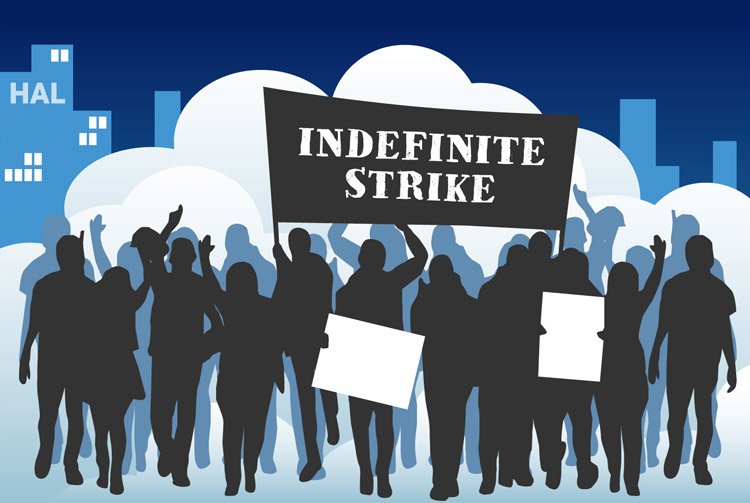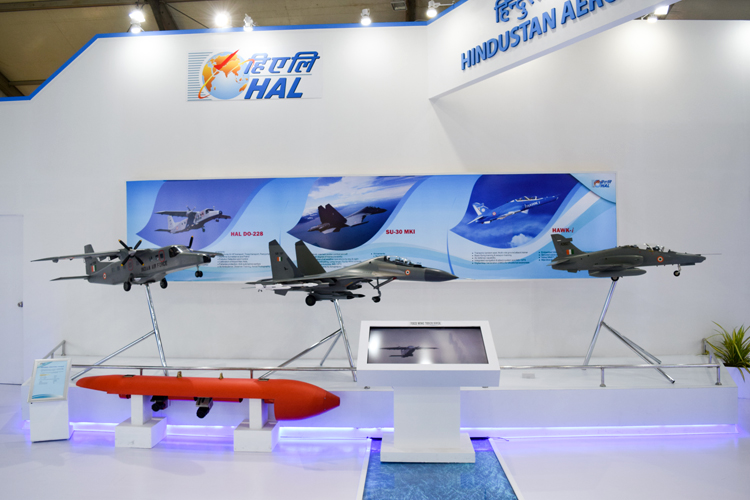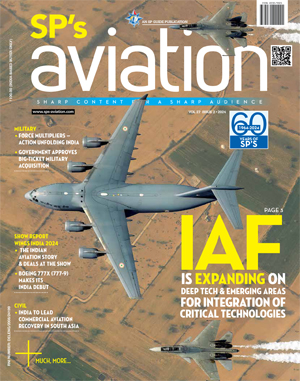INDIAN ARMED FORCES CHIEFS ON
OUR RELENTLESS AND FOCUSED PUBLISHING EFFORTS

SP Guide Publications puts forth a well compiled articulation of issues, pursuits and accomplishments of the Indian Army, over the years

I am confident that SP Guide Publications would continue to inform, inspire and influence.

My compliments to SP Guide Publications for informative and credible reportage on contemporary aerospace issues over the past six decades.
HAL's "indefinite" strike paralyses India's sole aircraft manufacturer
The strike at India's biggest Defence PSU comes at a time when there's a renewed emphasis on indigenisation of Defence procurements. While the private sector alternate has not emerged at the pace at which it was expected to, the domineering public sector is still beset with issues of performance and legacy work culture, which has been put under the spotlight again by the HAL workers strike

The "indefinite" strike by an estimated 20,000 employees of Hindustan Aeronautics Limited (HAL) continued for the third day on October 16, with talks between the management and the unions deadlocked.
The strike has crippled operations at all production centres of India's sole aircraft manufacturer, affecting critical work on the assembly lines of the Sukhoi-30MKI and LCA Mk 1 fighters, Advanced Light Helicopters and the upgrade of Mirage-2000 fighters.
The labour unrest is over demands for wage revision for workers at par with that for the executive class. Consequently, unions have sought a reported 35 per cent hike in wages and up to a 140 per cent increase in perks. These demands have been stonewalled by the management of the public sector behemoth, which has termed the strike as "illegal"
Unions have claimed success in disrupting work. "The response to our strike call has been overwhelming with all the employees abstaining from work in the nine production locations across the country," HAL Trade Union general Secretary S. Chandrasekhar was quoted in news reports.

The labour unrest is over demands for wage revision for workers at par with that for the executive class. Consequently, unions have sought a reported 35 per cent hike in wages and up to a 140 per cent increase in perks. These demands have been stonewalled by the management of the public sector behemoth, which has termed the strike as "illegal".
Eleven rounds of talks with the unions failed to avert the strike. In public statements, HAL management has termed the demands as "unviable", "unsustainable" and "untenable", and at variance with the wage agreements in other Defence PSUs.
HAL will be bidding for all forthcoming big ticket procurements, including the one for 114 multi-role fighter aircraft and another for 111 Naval Utility Helicopters under the new Strategic Partnership Model. It is also the production agency for the indigenously developed Light Combat Aircraft Tejas, for which a fresh order is in the offing. The aircraft manufacturing monopoly is also set to get an order for licensed manufacturing of 140 Ka-226 Light Utility Helicopters for the Indian Army. All these programmes represent critical operational requirements
The root of the contention appears to be the unwillingness of the management to concede a similar rate of revision to the workers as the one allowed for the executive class. The logic is that while the wage hike for the executives was effected after 10 years, the workers have one every five years. The wage deal with the workers has been hanging fire since 2017.
"There is no justification and rationale in the demand of the Unions to extend the benefits (fitment benefit and allowances) on par or more than executives, when salary revision of executives was effected from January 1, 2017 after stipulated 10 year period. The increase in respect of officers with effect from January 1, 2017 needs to be compared with the base of January 1, 2007. On the other hand, workmen have two wage revisions of five years periodicity during the same span. The revision needs to be settled keeping in view the increase derived by the officers from the 2007 scales to the 2017 scales and by the workmen from the 2007 scales to the 2012 scales and now 2012 to the 2017 scales," Gopal Sutar, the HAL spokesperson stated in a press release.
"Management has also offered to enhance allowances under Cafeteria system @ 22 per cent for workmen in Scale 1 to 10, and 20 per cent for workmen in Special Scale as against uniform rate of 19 per cent offered earlier and also assured that all the workmen will stand benefitted in terms of allowances on account of introduction of Cafeteria system....Management offered revised rate of Fitment benefit @11 per cent," the HAL spokesperson elaborated.
The strike at India's biggest Defence PSU comes at a time when there's a renewed emphasis on indigenisation of Defence procurements. While the private sector alternate has not emerged at the pace at which it was expected to, the domineering public sector is still beset with issues of performance and legacy work culture, which has been put under the spotlight again by the HAL workers strike.
HAL will be bidding for all forthcoming big ticket procurements, including the one for 114 multi-role fighter aircraft and another for 111 Naval Utility Helicopters under the new Strategic Partnership Model. It is also the production agency for the indigenously developed Light Combat Aircraft Tejas, for which a fresh order is in the offing. The aircraft manufacturing monopoly is also set to get an order for licensed manufacturing 140 Ka-226 Light Utility Helicopters for the Indian Army. All these programmes represent critical operational requirements.
Workers have so far not responded to appeals that their strike is harming India's defence readiness. "During the negotiations, the Wage negotiation committee also apprised the Unions the ill-effects of resorting to any Strike/agitation jeopardising the interest of the employees / Organization & the Nation at large," HAL statement added.





